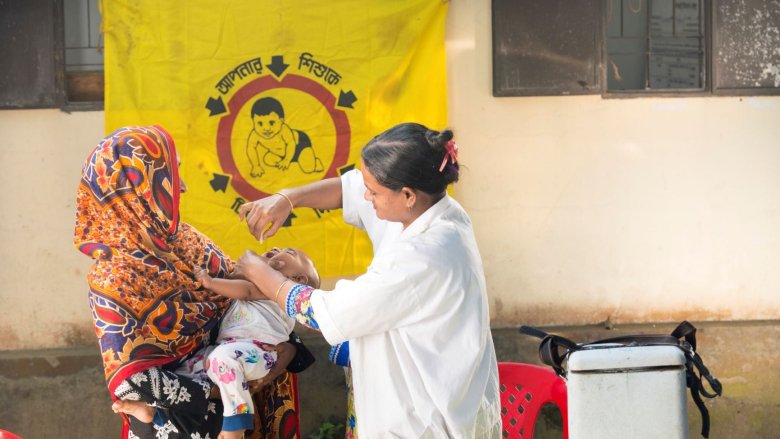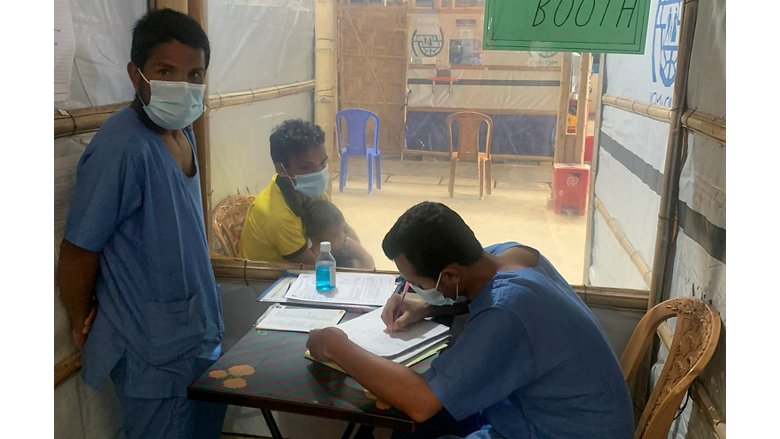Challenge
In 2020, Bangladesh imposed several lockdowns to address the spread of COVID-19, including a nationwide lockdown from March 26 to May 30. During lockdown, the outreach sessions of the Expanded Program on Immunization (EPI) were suspended. Even after lockdowns were lifted, some households did not allow field health workers to enter their homes for fear of spreading infection. At the same time, community clinics and Union Health and Family Welfare Centers shifted their focus to COVID-19-related services. These developments presented a serious challenge for child immunization services.
Approach
Bangladesh��s Ministry of Health and Family Welfare (MOHFW) identified approaches to quickly restore EPI coverage. These included: maintaining the supply chain line followed by rigorous monitoring; developing district-specific vaccination plans to reach households that had not received vaccines; creating awareness through intensive communication campaigns; and dispatching outreach teams to remote areas. These approaches allowed the Ministry to identify locations with low coverage and then take remedial action. Field health workers carried out active vaccine defaulter tracing by going house-to-house to address misinformation and stigma such as outside exposure and contacts attached to COVID-19 that affected routine child vaccination services. Reminders were sent by text and telephone to attend immunization sessions. Mass communication through various means were conducted and volunteers were engaged to escort mothers to vaccination sites to ensure their children were vaccinated against common childhood infectious diseases. The government provided special passes to allow EPI staff to move about during lockdowns.
Essential health services and supply of non-Gavi vaccines for the displaced Rohingya population were also planned and provided under the Project To respond to the additional needs of the refugees and the host population adjacent to the camps due to the COVID-19 pandemic, activities were repurposed to support strengthening infection prevention and control, triage, early detection, isolation and case management. In the camps for displaced Rohingya, routine vaccination sessions were moved from locations in the community to a health facility to ensure that infection prevention and control measures were observed and vaccine providers were given personal protective equipment.
Results
The measures halted a drastic drop in the immunization of children under 12 months that occurred during April and May 2020 as a result of the COVID-19 outbreak. Coverage was restored, both in the HSSP-supported divisions of Chattogram and Sylhet as well as the camps for the displaced Rohingya people. Further, the restored immunization coverage were sustained in 2021 despite the new waves of COVID-19 outbreaks.
In the Sylhet and Chattogram divisions 1,212,206 children (0-11) months were vaccinated in 2021 compared to 1,136,888 in 2020. In the camps for the displaced Rohingya people, 28,585 children (0-11) months were vaccinated in 2020 and 25,864 in 2021.
Bank Group Contribution
The HSSP, approved in 2017, supports the government��s Fourth Health, Population and Nutrition Sector Program with financing from the International Development Association (ŷ����b��Ƭ) in the amount of $550 million.
Partners
Under a Sector-Wide Approach (SWAp), the Global Financing Facility added $15 million to the ŷ����b��Ƭ project financing envelope, complemented by $120.3 million from a Multi-Donor Trust Fund (MDTF) to which five development partners contributed (the United Kingdom, Canada, the Netherlands, Sweden, and GAVI, the Vaccine Alliance) for health system strengthening including provision of essential health services and maintaining high levels of immunization
coverage in Sylhet and Chattogram divisions, where coverage levels fluctuate and are often below national averages. For FY2021 and 2022, the project was expanded to cover the division of Barisal as well for immunization coverage.
The project has been implemented by the MOHFW. However, the country-based development partner consortium members and the MOHFW meet regularly to review progress and plan the needed technical assistance. Besides, four UN agencies (WHO, UNICEF, UNFPA, and the IOM) have been directly involved in supporting health services for the displaced Rohingya population.
Moving Forward
Achievements under Component 4 of the HSSP to provide health services for displaced Rohingya people have been continued through the US$150 million Health and Gender Support Project grant financed through the ŷ����b��Ƭ18 Refugee Sub-Window (RSW).
The Government of Bangladesh, the World Bank, and other development partners are planning to discuss collaboration and assistance under a new sector program.
Beneficiaries
Gulapjan Bibi was only 17 years old when she, among several hundreds of thousands of Rohingya, fled to Bangladesh. She used to visit the UNICEF-supported health post in one of the Cox��s Bazar DRP camps which has been upgraded to a full-fledged hospital supported by the HSSP. Gulapjan gave birth to two healthy babies on February 18, 2021. She left the hospital with a big smile on her face. ��This hospital is a ray of hope for people in their miserable camp life,�� she said to the nurse on duty.

